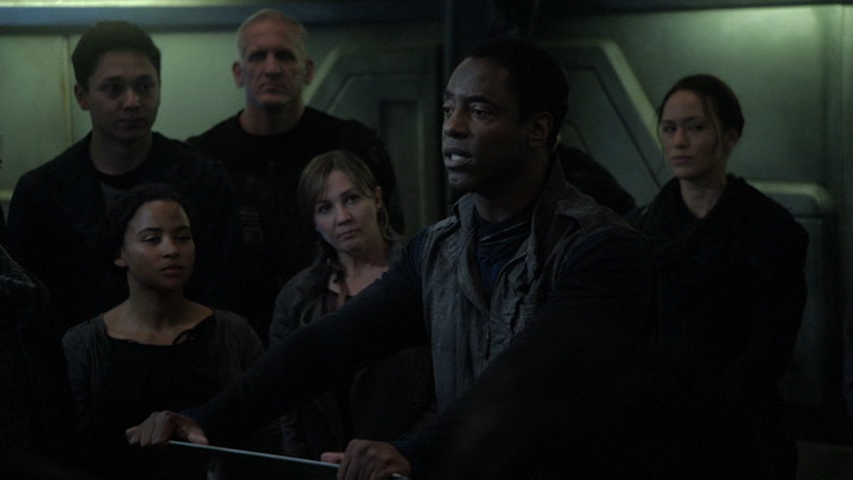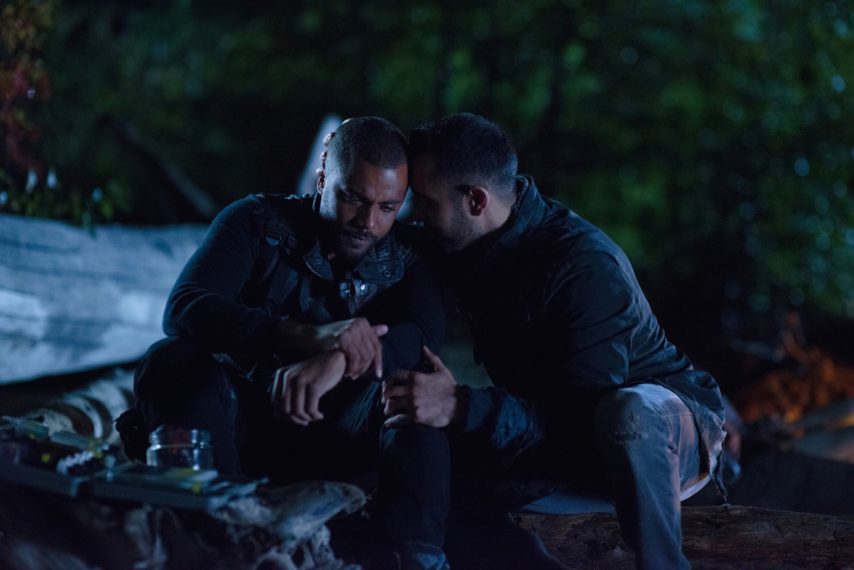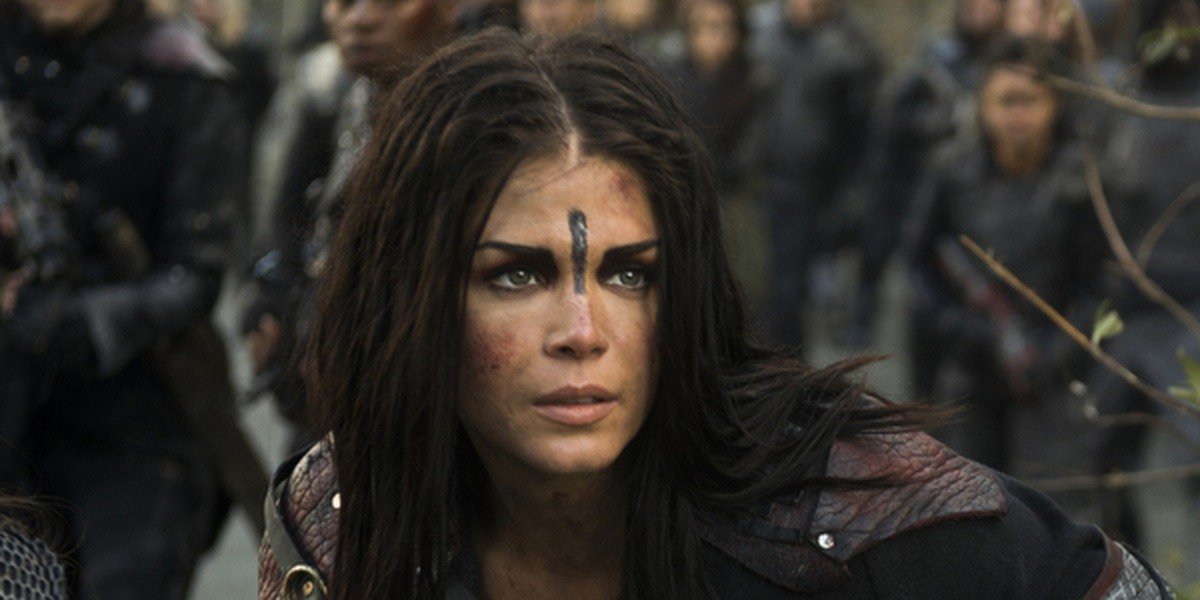‘Avatar: The Last Airbender’ is now on Netflix
The original series is now on Netflix, you should definitely give it a watch. And if you’ve already seen it, watch it again.
Incluvie Foundation Gala - Learn More
In the world of The 100, mankind has overcome some of the most severe and oppressive prejudices we encounter today. But the fact remains that no matter what human beings are fighting about, even in the fictional future, we as a species cling to an “us versus them” approach to life. (Please note, I won’t be addressing the in-house issues that have been brought to viewers’ attention over the years, as we’re not privy to all the facts, though this is obviously an enormous failure that needs to be addressed at some point.)
One of the brightest spots of the show is how relentlessly it overcame the bigotries of our modern era. From the very first episode, we’re presented with a Black Chancellor, Thelonious Jaha (Isaiah Washington), in charge of what we’re to assume is the remainder of the human race. And as the series unfolds, we see further proof that the people in this time period have blessedly broken through some of the deeply divisive issues that plague our generation.

Race, nationality, and ethnicity seem to be not only a nonissue, but quite broadly represented throughout the show, both in the main characters and side characters. No one dares think a person is any bit inferior or superior based on the color of their skin. In the same vein, women are no less represented than men, even at the highest echelons of leadership and governance. We have women leaders across the board: From Abby’s first foray into Chancellorhood, to Clarke being the de facto leader of Skaikru, to Lexa leading the Grounders with Indra as her right-hand woman, to Octavia winning the Conclave and being Wonkru’s leader, women from all factions are arguably the greatest leaders and most respected in their clans. Even the religious leadership falls to a biracial woman when Gaia becomes Fleimkepa.
Further, just as it matters not what a person’s race or gender is, nor does it matter how anyone identifies in terms of sexuality. While Titus did not want Lexa to focus on Clarke, he had no qualms with Clarke being a woman. He was worried that Lexa’s concern for Clarke would take her focus away from her leadership pursuits. Miller and Jackson were arguably the healthiest examples of a romantic relationship the show had, all while being gay men of color. They were respected leaders to whom no one seemed to even consider discriminating against. Basically, the show showed us that we can, and its hope is that we will do better.

That isn’t to say the show didn’t showcase how we as humans are predisposed to divide ourselves. Because while the biggest divisors of our era may no longer be in play (and thank goodness that humankind has made some progress in that regard), they were still able to find various characteristics to declare hate against their fellow man.
In the Grounder world, factions are divided quite literally by which tree line you happened to be born between. On one side of the Azgeda line? You’ve just found yourself an enemy in Trikru territory. This didn’t exclude the folks who came down from the Ark, either. They were outsiders to every clan, at least at the start, and were immediately made adversaries.
Mount Weather took a different approach to who they hated indiscriminately; they saw all Grounders as “savages”, and clearly “less-than”, based solely on their differing lifestyle choices and flat-out ignorance. That, and it made it easier for the Mountain Men to indiscriminately kill Grounders when they had a use for their blood. We can certainly see parallels to this in virtually all human societies throughout history. People hate based on ignorance and the absolute disinterest in wanting to see the world through someone else’s perspective. In The 100, this view is clearly shown to be distasteful, as it leads to the ultimate demise of Mount Weather, when they could have (quite easily, really) worked in cooperation with Skaikru to have bone marrow donated, rather than killing children. But their discriminatory hate and stubborn denial of the world around them was their downfall.
Interestingly, even at the (second) end of the world, the clans continued to fight each other for the chance of survival. It took Octavia winning the Conclave, with the teachings of Lincoln, Indra, and even Kane to help her come to the decision that all clans are of equal importance and merit, and all clans should survive Praimfaya. That, too, eventually broke down in the bunker, but more out of necessity perhaps than hate. But when Wonkru emerged to an Earth with new factions, they stood by their mantra of “You are Wonkru, or you are the enemy of Wonkru”, even when it was in their best interests to work with the other survivors.
By the time everyone from Earth makes it to Sanctum, we’ve seen some of the worst of humanity (and true, some of the best of it). Or, so it seemed. Because on Sanctum, the folks in power want only to remain in power and will stop at nothing to do so. They treat those who aren’t their elite inner circle as much less-than, using their bodies as they wish, and being so malevolent that they’d discard actual human children for not being able to help their cause genetically. It’s abhorrent on a new level and is a glaring showcase for what can happen when any one person or group retains power for so long. The concept of being stuck in an endless tyrannical society hits far too close to home, frankly, and it was alarming to see how easily good, decent people could be convinced that their leaders have their best interest at heart when in truth, Russell and the others saw them as nothing more than servants and future body producers.

Perhaps the most haunting parallel to our current societal failings was that of Pike and his followers in Season 3. Pike’s experiences at the hands of a few murderous Grounders (all of whom were Azgeda) colored his perception of all Grounders, regardless of the truth. Pike was not only willing to share and spread his message of hate, but he was willing to do so very loudly. While Kane, Abby, Clarke, and Lincoln were working hard to broker for peace, many were pulled in by Pike’s message. Just as in our present-day society, a horrifyingly large percentage of Arkadia’s population found his unreasonable and uninformed messages appealing, seemingly even more so as they devolved to cries for violence against their perceived enemy. Even while Kane attempted to provide facts and alternatives to hateful rhetoric, Pike’s group refused to stray from their mob-like behavior. It’s all the more stunning when we take into account that this season was written and filmed in 2015, long before these events came to fruition in real-time.
The core of the show did see people overcoming their persistent need to hate, however. The hateful never prevailed, not in the end. Pike finally saw who the Grounders really were, perhaps too late, but his followers (significantly, Bellamy and Monty,) had already seen the error of their hateful rhetoric. The Grounders who wanted to kill the 100 just for existing were met with a ring of fire. Mount Weather, of course, met their end as a society, in one of the most brutal but necessary choices of the show. Wonkru eventually had to give up their fight and meld into the rest of Earthkru. Russell was finally stopped from stealing bodies and killing children for his own twisted needs. And in the finale, when Octavia made her powerful last stand to stop the fighting once and for all, humanity listened. And humanity survived.

While there are absolutely elements of the finale that don’t fit with the powerful statements the series has made, the ultimate messages remained intact. For humans to not just survive, but thrive, we must be willing to work together. We are always better in collaboration and peace than in turmoil and strife. And that, for me, was the takeaway. That humanity can (and will) keep doing better. Perhaps we will fall back into the same traps from time to time, but that ultimately, the arc of morality will in fact bend toward justice.
(This article was originally posted by Shannon Mizikoski on Medium.)
Related lists created by the same author
The original series is now on Netflix, you should definitely give it a watch. And if you’ve already seen it, watch it again.